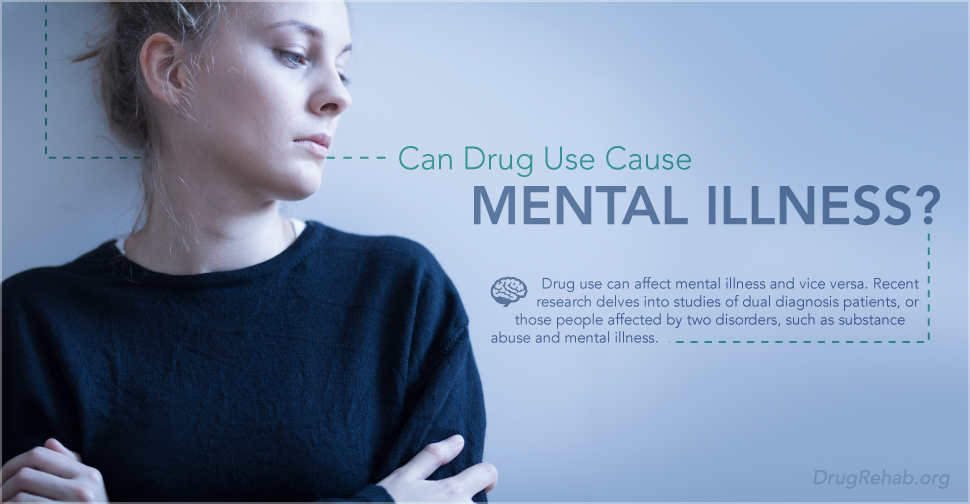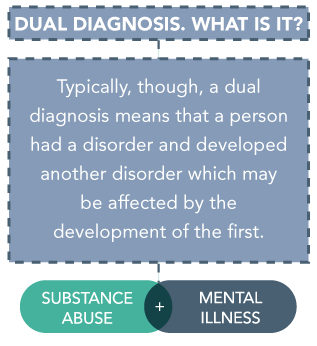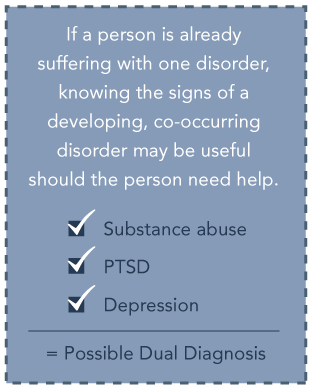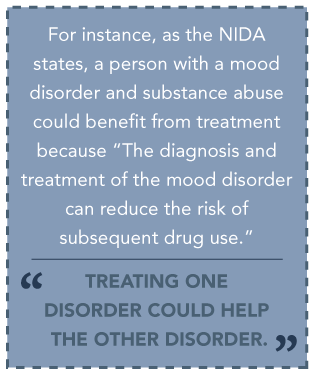
Have you ever known someone who abuses drugs, and suspected that person may be suffering with mental illness? While you may not be a doctor, you also may not have been wrong in your concern. Drug use can affect mental illness and vice versa. Recent research delves into studies of dual diagnosis patients, or those people affected by two disorders, such as substance abuse and mental illness. What is clear is that when a person is dually affected by disorders, each disorder tends to affect the other.
But can one cause the other? In particular, can drug use cause a person to develop a mental illness? To understand the answer to this question, it may be important to know how dual diagnoses work, what they are, common symptoms of drug abuse and mental illness, and what treatments may be best for a person affected by both disorders.
Dual Diagnosis—What Is It?
As explained briefly above, a dual diagnosis occurs when one person is diagnosed with two disorders or diseases. Typically, though, a dual diagnosis means that a person had a disorder and developed another disorder which may be affected by the development of the first. For example, a person who is abusing substances may develop depression or anxiety. In contrast, a person with depression or anxiety may turn to substances as a form of relief or solace. Unfortunately, as the National Alliance on Mental Illness (NAMI) explains, “research shows that drugs and alcohol may only make the symptoms of mental health conditions worse.”
 People affected by dual diagnosis may experience dire effects to their health; each disease can greatly influence the other, and either disease can occur first. Further, the problem of dual diagnosis is vast. As NAMI reports, “about a third of all people experiencing mental illnesses and about half of people living with severe mental illnesses also experience substance abuse.” The reverse is also true, as nearly the same amount of people affected by substance abuse are suffering from mental illness as well.
People affected by dual diagnosis may experience dire effects to their health; each disease can greatly influence the other, and either disease can occur first. Further, the problem of dual diagnosis is vast. As NAMI reports, “about a third of all people experiencing mental illnesses and about half of people living with severe mental illnesses also experience substance abuse.” The reverse is also true, as nearly the same amount of people affected by substance abuse are suffering from mental illness as well.
Yet, the National Institute on Drug Abuse (NIDA) reports that, “the high prevalence of comorbidity between drug use disorders and other mental illnesses does not mean that one caused the other, even if one appeared first.” In other words, though drug abuse and mental illness may appear together, even when in close succession, one does not necessarily cause the other to occur. Instead of focusing on how one disorder may cause the other, it is vital to learn about each disorder, how to recognize and prevent it, and especially how to treat it.
Drug Abuse And Mental Illness: Common Symptoms Of Each
Every instance of substance abuse may look different from the next, and the same for mental illness. However, there are some common symptoms which may appear with each disorder. If a person is already suffering with one disorder, knowing the signs of a developing, co-occurring disorder may be useful should the person need help. Some of the signs of drug abuse may be:
- Behavioral changes
- Engaging in risky or illegal behavior due to drug use
- Experiencing symptoms of withdrawal
- Inability to stop drug use, even when the person tries
- Needing to use drugs to be able to start a day or function throughout the day
- Seclusion: especially from those close to the person
- Tolerance to effects of substances
 Symptoms of mental illness are great in number, but some may signal the development of a disorder. A person with a developing mental illness may have problems concentrating at school or work, undergo severe mood changes, withdraw from family or friends, or have suicidal thoughts.
Symptoms of mental illness are great in number, but some may signal the development of a disorder. A person with a developing mental illness may have problems concentrating at school or work, undergo severe mood changes, withdraw from family or friends, or have suicidal thoughts.
So, what can be done to help people afflicted with drug abuse or mental illness? Treatment is the best way to help a person begin to heal from substance abuse and manage mental illness. Though there is no one cure for either, a person may learn to abstain from substance abuse to live a healthy, fulfilling lifestyle, and may learn to cope with mental illness.
Treatment For Drug Use And Mental Illness
Treatment for dual diagnosis must be comprehensive, or must address the needs and issues of both a person’s illnesses. People undergoing treatment at the same time for two disorders have a long treatment road ahead of them. But completing treatment may give them the results they want and deserve. For instance, as the NIDA states, a person with a mood disorder and substance abuse could benefit from treatment because “the diagnosis and treatment of the mood disorder can reduce the risk of subsequent drug use.” Treating one disorder could help the other disorder.
 Some of the best treatments can occur in an inpatient rehab facility, where an individual has access to care and monitorization round the clock. For people with co-occurring disorders, medication may be necessary and supervised administration may be required. Also, behavioral therapy and counseling can greatly help a person who is struggling with the heightened issues of mental illness and the desperate urges of substance abuse. Whatever treatment plan a person chooses, it should work to effectively treat the issues of all diagnoses.
Some of the best treatments can occur in an inpatient rehab facility, where an individual has access to care and monitorization round the clock. For people with co-occurring disorders, medication may be necessary and supervised administration may be required. Also, behavioral therapy and counseling can greatly help a person who is struggling with the heightened issues of mental illness and the desperate urges of substance abuse. Whatever treatment plan a person chooses, it should work to effectively treat the issues of all diagnoses.
Where To Find Treatment For Co-Occurring Disorders
When a person has one disorder, finding treatment can be tough. When a person is affected by two disorders or more, this process may escalate to overwhelming. If you have a loved one who is struggling and want to get them the help they need, you don’t have to go it alone. Contact us today at DrugRehab.org for answers to your questions, information about treatment, and to learn more about our treatment centers.
Sources
MentalHealth.gov—Mental Health And Substance Use Disorders
National Alliance On Mental Illness—Dual Diagnosis
National Institute On Drug Abuse—Comorbidity: Addiction And Other Mental Illnesses


